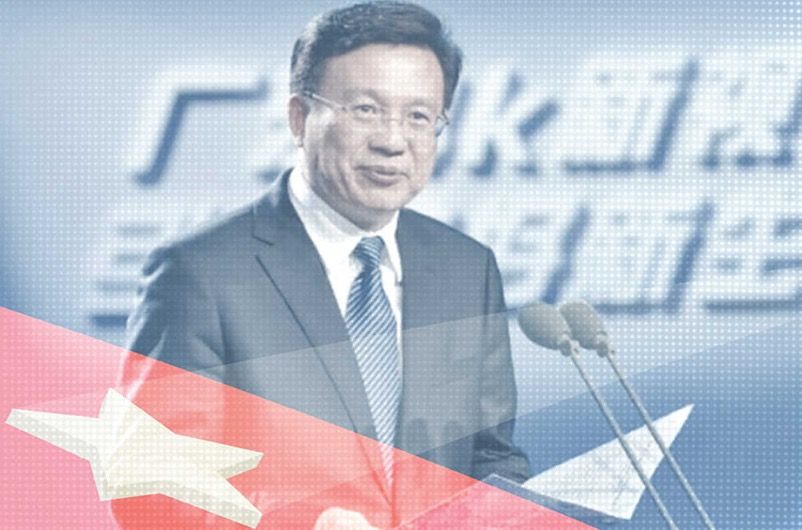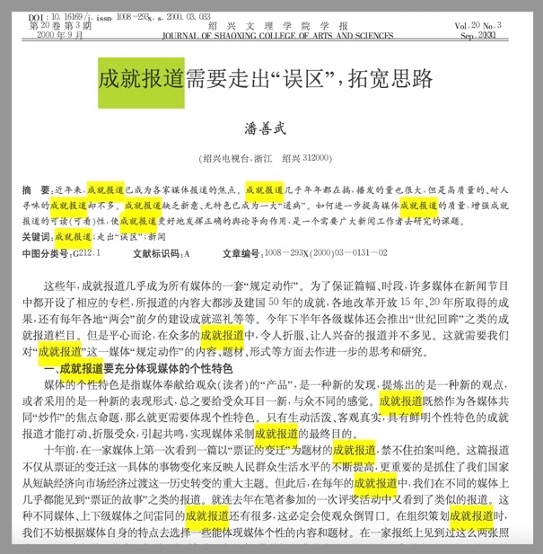
Earlier this month, Chinese Journalist (中国记者), an official journal on media published by Xinhua News Agency, ran an article laying out the essential role to be played by news agency journalists in the coming years. Attributed to the agency’s president, Fu Hua (傅华), the article is an illuminating look at just how cowed Party-run media have become under the leadership of Xi Jinping.
Perhaps more definitively than at any point in China’s reform era, the mission of CCP media today is about whitewashing the record of the general secretary and the top leadership, building the case that a “great transformation” has been underway in China.
Fu begins by emphasizing the so-called “Five Firm Grasps” (五个牢牢把握), one of the key catchphrases emerging from the recent 20th National Congress of the Chinese Communist Party. In particular, Fu stresses that the first of the “Five Firm Grasps” defines the way forward for Xinhua. The news agency, he writes, “will firmly grasp the significance of the work of the past five years and the great transformation of the new era, carefully organizing achievement reports and model propaganda.”
“Achievement reports,” or chengjiu baodao (成就报道), are news stories that amplify the successes of the leadership, often around important milestones and commemorations. Such reports are not new, but in Xi’s “New Era,” when every day is a fresh opportunity to declare victory, they have become far more routine.
Special Occasions
In the Party’s official People’s Daily, references to achievement reports go back to the early 2000s and the run-up to the 16th National Congress, when Jiang Zemin’s theory of the “Three Represents” was being feted ahead of its inclusion in the Party Charter. In September of that year, a special series of articles appeared in the News Frontline (新闻战线), another core CCP media journal, in which editors from the Economic Daily, Nanfang Daily, and other newspapers discussed “how to innovate achievement reports.”
It was a time of media experimentation. Propaganda was changing too. In January 2003, the new propaganda chief, Li Changchun (李长春), would introduce the “Three Closenesses” (三贴近), an approach to media control that at the same time recognized the need to commercialize the sector and make media products more attractive to ever more savvy audiences.
Talk of the need to transform media and propaganda had already been in vogue for a number of years, on the back of a media commercialization process already well underway. In one article for an obscure academic journal published in September 2000, Pan Shanwu (潘善武), a local television producer in the city of Shaoxing, had written of the need to breathe life into the achievement report.
In recent years, achievement reports have become a ‘prescribed action’ for all media. In order to ensure the proper dedication of space, many media outlets set up special columns, dealing with the achievements for the 50th anniversary of the founding of the PRC, or of the 15th and 20th anniversaries of reform and opening. . . . In all fairness, however, there are few compelling reports on achievements in the media. We must devote further thought and study to the content, subject matter, and form used for the ‘prescribed action’ of the achievement report.
Generally speaking, achievement reports were prescribed for special occasions. And this prescriptive approach, Pan suggested, invited a mechanical response, when in fact media should emphasize “individuality” (个性特色). Pan referred at the time to the novelty of the idea that media were offering “products” to readers.

Innovated or not, achievement reports continued to be a focus of CCP media planning around special events. From time to time there were even achievement reports for achievement reports. As the 60th anniversary of the founding of the PRC approached in 2009, the People’s Daily ran an article praising its work hyping the event. The paper boasted that it had created a whole series of achievement reports that had “helped the masses of readers deeply understand the establishment and development of our great motherland.”
The New Era: Special All the Time
In the Xi era, achievement reports seem to have become a topic for constant hand-wringing and consideration as propaganda officials and communications experts fall over themselves to strategize for the build-up of China’s discourse power — and as the Party-state media enter a period of renewed emphasis on obedience and positivity.
During his first major meeting on propaganda and ideology in August 2013, Xi Jinping introduced the notion of “telling China’s story well” (讲好中国的故事), finding new ways to conduct propaganda, both domestically and overseas. He also spoke of the need to “transmit positive energy” (传播正能量) — in other words, to promote uplifting messages about China and its ruling party as opposed to critical or negative ones.
Xi Jinping’s focus on propaganda innovation and positivity naturally invited a reconsideration of the achievement report.
In November of that year, just weeks after Xi attended the Central Forum on Arts and Literature with more messages about the need for obedient journalists and online writers, Zou Xianqi (邹贤启), the president of the Hubei Daily Media Group, wrote in the People’s Daily to discuss the “innovation” of front pages at CCP newspapers. He praised the work of his group’s flagship Hubei Daily, claiming that it had trailblazed with a series of front-page reports touting local economic growth, new investment policies, and so on. The paper, he said, had “broken through the simple narrative mode of achievement reporting.”
Xi’s further elevation during the 19th National Congress in 2017 fueled a continued upsurge in achievement reporting. As China Central Television reflected back on its work in 2018, the network’s deputy chief editor, Wei Quhu (魏驱虎), became over-excited with war metaphors, telling the Cyberspace Administration of China’s New Media magazine that “in the battlefield of the 19th National Congress coverage, CCTV entered the field early, broadened the front, focused its attack, occupied the high ground, and achieved remarkable war results.”
CCTV’s ammunition? The achievement report, naturally. Wei noted, first and foremost, that CCTV had “strengthened the intensity of achievement reports,” touting China’s victories in the fight against poverty, improving people’s livelihoods, and protecting the environment.
But at its heart, achievement reporting wasn’t really about the substance of the country’s vaunted achievements at all. It was about obedience to Xi Jinping and the CCP Central Committee. This priority had become the intensely new order of the day, taking precedence over all content-related decision-making, following the general secretary’s February 19, 2016, speech on media policy, which had been accompanied by visits to the People’s Daily, Xinhua, and China Central Television.
In his speech, Xi insisted that all Party media were “propaganda positions” of the Party and that they must “love the Party, protect the Party and serve the Party.” Ultimately, the media must recognize before all other priorities their “partyness” (党性), that they were, as Xi made clear, “surnamed Party” (姓党). This took precedence over the notion of “peopleness” (人民性), that the media were meant to serve the people. To serve the Party, in fact, was the only way to serve the people.
As Xi Jinping’s power within the Party grew, “partyness” was increasingly Xi-ness. Telling the China story meant trumpeting the Party’s achievements under the inspirational guidance of Xi as the “core” leader. As Wei Quhu wrote at CCTV:
In the specific act of creation, the CCTV News Center’s production team clearly realizes that in order to make such loftily atmospheric and weighty thematic achievement reports really enter the hearts of viewers to trigger the resonance of ideas and emotional resonance, we must follow the spirit and requirements of General Secretary Xi Jinping’s important speech on February 19 [2016], adhering to the unity of party spirit and the people spirit . . .
For all the talk of “resonance,” Xi Jinping’s media policy has been a recipe for divorce from the audience and from reality.
If the Chairman Says So
Even as China’s economic problems mounted this year amid painfully restrictive Covid policies, the story of Xi Jinping’s economic genius had to take precedence. As Party media readied themselves over the summer for a rush of positive reporting ahead of the 20th National Congress, the Economic Daily reported the release in late June by the Central Propaganda Department of a “study guideline” for “Xi Jinping Economic Thought” (习近平经济思想), the phrase meant to signal the strength of the general secretary’s economic policy approaches.
The newspaper, published by the same Central Propaganda Department, pledged itself to three actions in promoting the economic work of the Party at a time of historic changes “such as have not been seen in a century.” First, it must abide by the principle of “politicians running the newspapers” (政治家办报), maintaining a high level of unity with “Xi Jinping as the core” in both politics and action. Second, it had to “create new heights in the propagation of Xi Jinping Economic Thought.” And finally, it had to promote the “vivid practice and living experience” of Xi Jinping Economic Thought by organizing topical propaganda and achievement reports.
When the People’s Daily published a notice on October 19, 2020, to congratulate groups and individuals — but mostly the Party itself — for achievements in poverty alleviation, it included the Emergency News Division of the Central Propaganda Department’s News Bureau, for “coordinating achievement and model reports on poverty alleviation policies and achievements,” which had “opened the great curtain on propaganda work” for 2020.
The Emergency News Division had indeed “opened the great curtain” in 2020. And so heavy was the curtain, in fact, that it had shoved aside coverage of the emerging global pandemic for two months.
In the People’s Daily, that coverage included a series called “The General Secretary Came to My Home” (总书记来过我的家), highlighting Xi’s official trips into the impoverished countryside. Writing about the CCP’s concerted propaganda push in early 2020, as the global pandemic raged, CMP co-director Qian Gang said that the Xi Jinping series, “with its feel-good reminiscences aggrandizing Xi Jinping as a man of the people, stands as a historical record of propaganda ugliness that cannot be whitewashed away.”
Fu Hua’s article in Chinese Journalist reminds us that now, more than at any point since the Cultural Revolution, whitewashing is the official policy in the Chinese media. Fu runs an ostensible news agency that understands its chief responsibility as looking back at the past and manufacturing its glories. This is the essence of the first of the “Five Firm Grasps” emerging from the October congress. All Chinese must “firmly grasp the significance of the work of the past five years and the great transformation of the new era.” For the media, this means embracing the achievement report as the primary form of news reporting. For Party officials and citizens, it means suspending doubt and swallowing criticism.
“History illuminates the future, and the journey has no end,” Fu wrote in the soaring conclusion to his song of obedience. But when history conveys no real lessons, when its primary business is to construct models of achievement and greatness, what it reveals instead is the rottenness at the core of the politics that have wrought it.




















